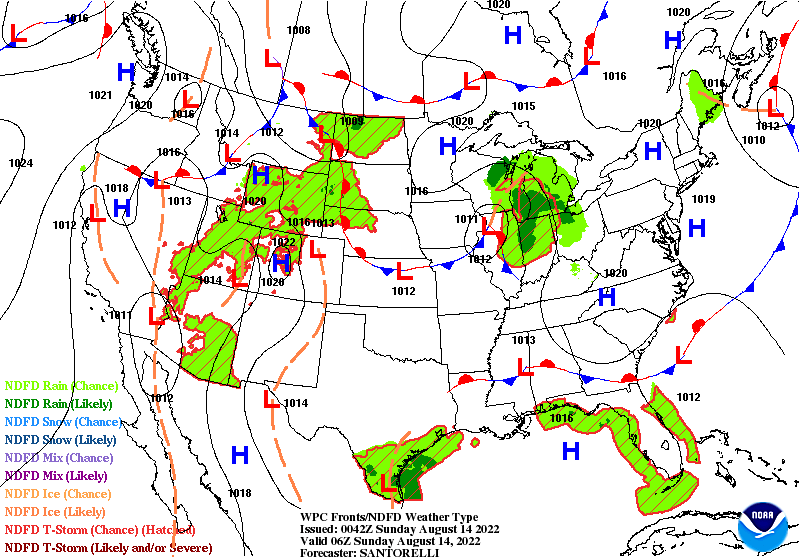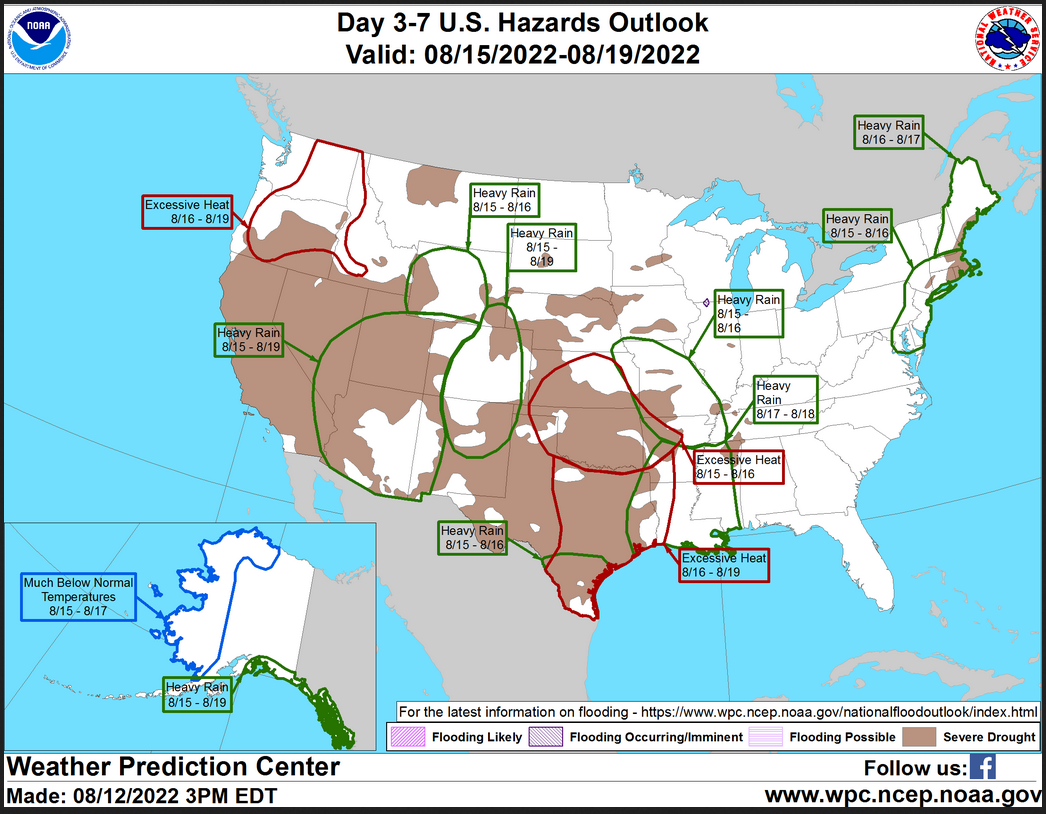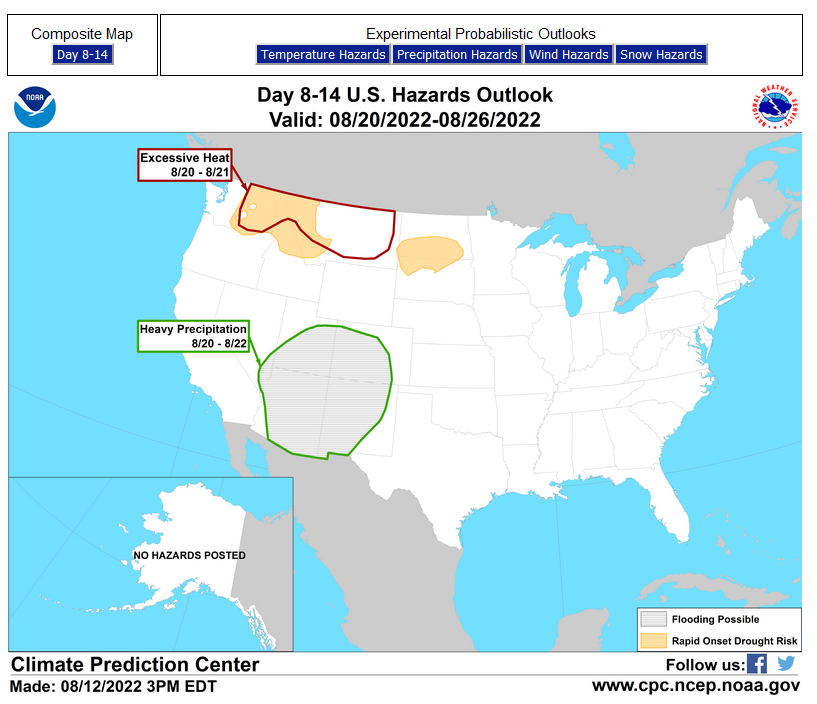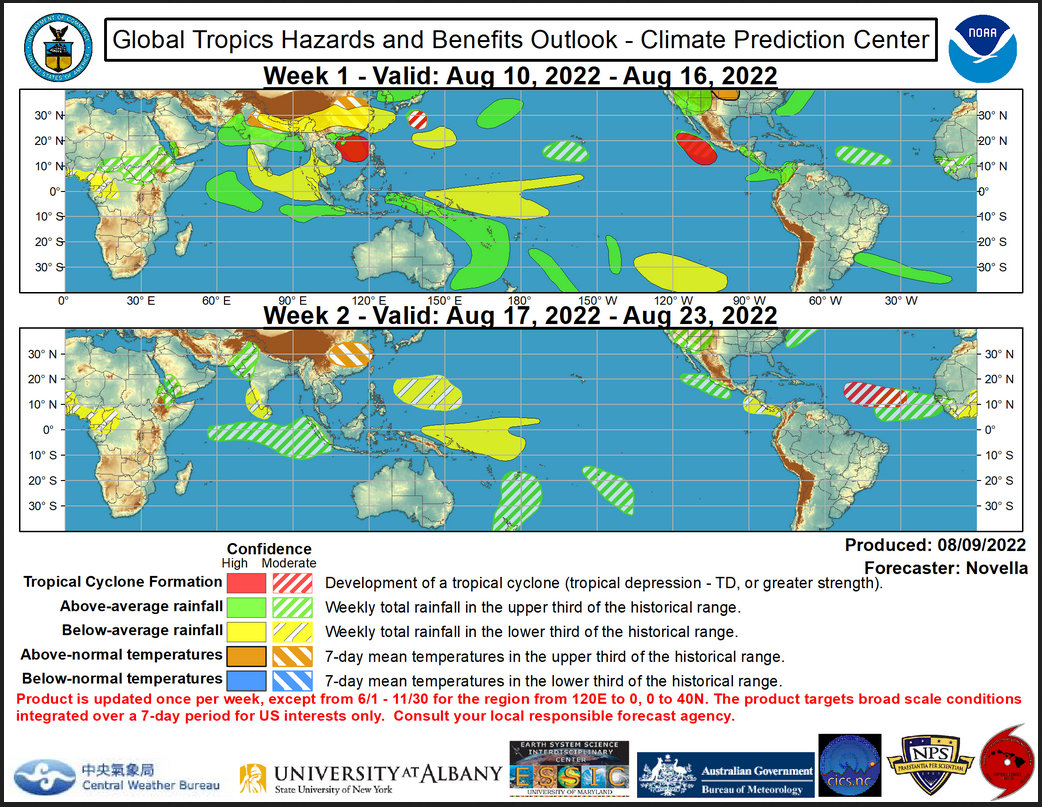Here is what we are paying attention to this evening and the next 48 hours from this evening’s NWS Forecast.
...Heavy to excessive rainfall likely across much of the Southwest/Intermountain West, as well as across south Texas... ...Much above normal temperatures likely this weekend across the central Plains, with a warming trend for parts of the West...
Continuation of the NWS Short Range Forecast (It is updated twice a day and these updates can be found here.
A very active monsoonal season will continue into at least early next week across the Southwest and into the central Great Basin and northern/central Rockies. Combined with a couple of upper level impulses, this moisture will bring periods of mainly diurnally driven showers and thunderstorms and locally heavy rain. WPC continues to highlight a fairly expansive slight risk on the Excessive Rainfall Outlook into Monday across this region. Soils in some of the region are overly saturated so its these areas, along with burn scars and urban communities, that will be most vulnerable to flash flooding and/or debris flows. Monsoonal moisture rounding an upper ridge stuck over the southern U.S. may also spread moderate to locally heavy rainfall into parts of the northern/central Plains Sunday into Monday. Elsewhere, a tropical disturbance drifting slowly westward in the western Gulf of Mexico will bring a period of heavy rainfall to parts of south Texas this weekend. Heavy to excessive rainfall is possible and WPC has highlighted this potential in the ERO. The rest of the Gulf Coast and into the Southeast can also expect showers and storms as tropical moisture interacts with a weakening surface boundary. Meanwhile, a weak surface low and associated front will drop through the Midwest and into the central Appalachians spreading showers and thunderstorms into the Ohio Valley and Mid-Atlantic this weekend. Locally heavy rainfall and flash flooding are possible. A heat dome parked over the south-central U.S. will keep temperature well above seasonal normal across much of the Plains this weekend. The most anomalous heat should present over the central Plains where daytime highs in the upper 90s to near or surpassing 100 is possible. Reinforcing troughing across the Great Lakes/Northeast will keep temperatures rather pleasant for mid-August, with daytime highs (and overnight lows) below normal. Upper level ridging building into the interior West and California will result in a warming trend through the weekend and lasting into next week.
Maps that relate the forecast to geography can be found by clicking Here for Day 1 and Here for Day 2.
Here is a 60-hour animated forecast map that shows how the short-term forecast is expected to play out.
If it needs to be updated click here.
HAZARDS OUTLOOKS
Click here for the latest complete Day 3 -7 Hazards forecast which updates only on weekdays. Once a week probably Monday or Tuesday I will update the images. I provided the link for readers to get daily updates on weekdays. Use your own judgment to decide if you need to update these images.
Worldwide Tropical Forecast
(This graphic updates on Tuesdays) If it has not been updated, you can get the update by clicking he re
Detailed Maps and Reports for the Western Atlantic and the Pacific Oceans
Below are three maps that summarize the situation for the Atlantic, Eastern and Central Pacific. Additional information can be accessed by clicking HERE
First the Atlantic
Click to view the forecast map and have access to additional information https://www.nhc.noaa.gov/gtwo.php?basin=atlc&fdays=5
Then Eastern Pacific
Click to view the forecast map and have access to additional information https://www.nhc.noaa.gov/gtwo.php?basin=epac&fdays=5
Then Central Pacific
Click to view the forecast map and have access to additional information https://www.nhc.noaa.gov/gtwo.php?basin=cpac&fdays=5
And the Western Pacific
Click to view the forecast map and have access to additional information https://www.metoc.navy.mil/jtwc/jtwc.html
Some Intermediate-Term Outlooks
Links to “Outlook” maps and discussions for three time periods. Days 6 – 10, Days 8 – 14, and Weeks 3 and 4. An outlook differs from a forecast based on how NOAA uses these terms in that an “outlook” presents information from deviation from normal and the likelihood of these deviations.
You have to click on the links because they do not update automatically and I do not want to have stale images in the article. But it is not difficult to click on a link and you get a large image plus a discussion. On Fridays in a separate article, we will show the images and provide a link in this article that article. But remember what you will see is the images as of Friday. But here you can get the current images simply by clicking on them. Then hit the return arrow at the upper left of your screen to return to the article. You will not find this information easily anywhere else.
Right now you can find these maps here (We show them every Friday there but you can click above and find them).
World Forecast for Day 6 (Currently Set for Day 6 but the reader can change that)
World Weather Forecast produced by the Australian Bureau of Meteorology. Unfortunately, I do not know how to extract the control panel and embed it into my report so that you could use the tool within my report. But if you visit it Cli ck Here and you will be able to use the tool to view temperature or many other things for THE WORLD. It can forecast out for a week. Pretty cool. Return to this report by using the “Back Arrow” usually found top left corner of your screen to the left of the URL Box. It may require hitting it a few times depending on how deep you are into the BOM tool. Below are the current worldwide precipitation and air pressure forecasts for six days out. They will not auto-update and right now are current for Day 6. If you want the forecast for a different day Click Here I will try to update this map each day but you have the link so you can access the dashboard and get a wide variety of forecasts.
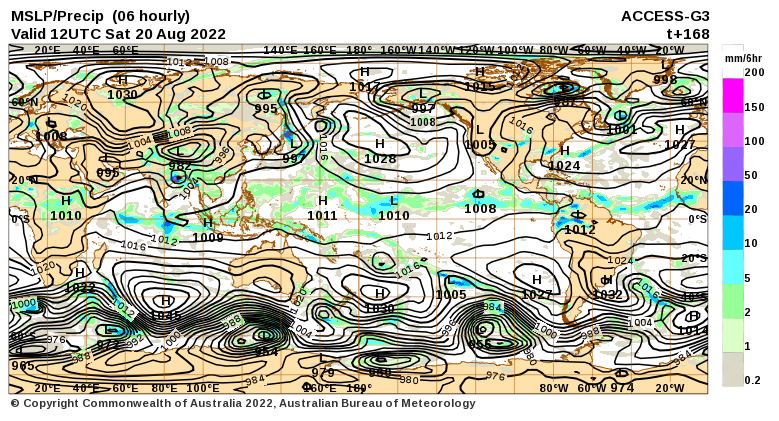 I mostly rely on the reader to interpret world maps. For this map, areas of expected precipitation for the date and time shown are clearly shown.
I mostly rely on the reader to interpret world maps. For this map, areas of expected precipitation for the date and time shown are clearly shown.
The number of High-Pressure systems shown is called the Wave Number. Maybe I will discuss WN someday. But it shows how many Rossby Waves there are around the World. Sometimes they are hard to count. Counting Low-Pressure systems should provide the same WN. Rossby Waves are the way the temperature distribution of the Planet remains in balance. It is basically the science of fluid dynamics. It can be very helpful in predicting the movement of weather patterns.
Month to Date Information
Month to date Temperature can be found at https://hprcc.unl.edu/products/maps/acis/MonthTDeptUS.png
Month to date Precipitation can be found at https://hprcc.unl.edu/products/maps/acis/MonthPNormUS.png

